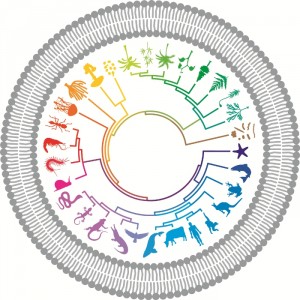 Inside insects there is an open cavity called the hemocoel, in which fluid and cells known as hemocytes circulate due to the pumping of a heart. The hemocytes have a primary role in immune defense, killing pathogens by phagocytosis and via the production of anti-microbial factors. A study by Jonas King and Julian Hillyer published in BMC Biology adds to our understanding of insect hemocyte biology in three ways. First, it provides a quantitative map of their anatomical distribution, and shows that hemocytes attached to tissues (i,e sessile rather than circulating) form a major component of the mosquito immune system. Second it finds that their numbers diminish with age, but increase in response to infection. Third, it captures circulating hematocytes that are undergoing mitosis, showing that hemocyte proliferation in adult mosquitoes does not require a discrete organ or progenitor cell type.
Inside insects there is an open cavity called the hemocoel, in which fluid and cells known as hemocytes circulate due to the pumping of a heart. The hemocytes have a primary role in immune defense, killing pathogens by phagocytosis and via the production of anti-microbial factors. A study by Jonas King and Julian Hillyer published in BMC Biology adds to our understanding of insect hemocyte biology in three ways. First, it provides a quantitative map of their anatomical distribution, and shows that hemocytes attached to tissues (i,e sessile rather than circulating) form a major component of the mosquito immune system. Second it finds that their numbers diminish with age, but increase in response to infection. Third, it captures circulating hematocytes that are undergoing mitosis, showing that hemocyte proliferation in adult mosquitoes does not require a discrete organ or progenitor cell type.
Sessile phagocytic hemocytes are found everywhere except inside the antennae and halteres. The vast majority are attached to the abdominal wall, particularly around the trachea, and in the region of the heart valves, where they are well placed to trap and phagocytose any circulating pathogens. When labeled E coli are injected it is the circulating hemocytes and those attached around the heart valves that increase in numbers, whereas the decline in hemocyte numbers seen with age occurs in both sessile and circulating compartments. In young mosquitoes there is an even dispersion of sessile hemocytes throughout the abdominal wall and at 1-2 days post emergence, some had internalized muscle fibers and nuclear materials that were likely remnants of larval swimming muscles, suggesting a role in shaping the internal architecture of the developing adult.
These informative observations should prove a valuable reference for future work on hemocyte function, particularly in mosquitoes, whose immune response may affect the transmission of human parasites such as malaria.
- Economists listen to Ecologists: On Biology at the World Economic Forum - 9th March 2018
- The secret language of behavior - 31st January 2017
- Restoring a lost microbiome to a model worm - 12th May 2016
Comments